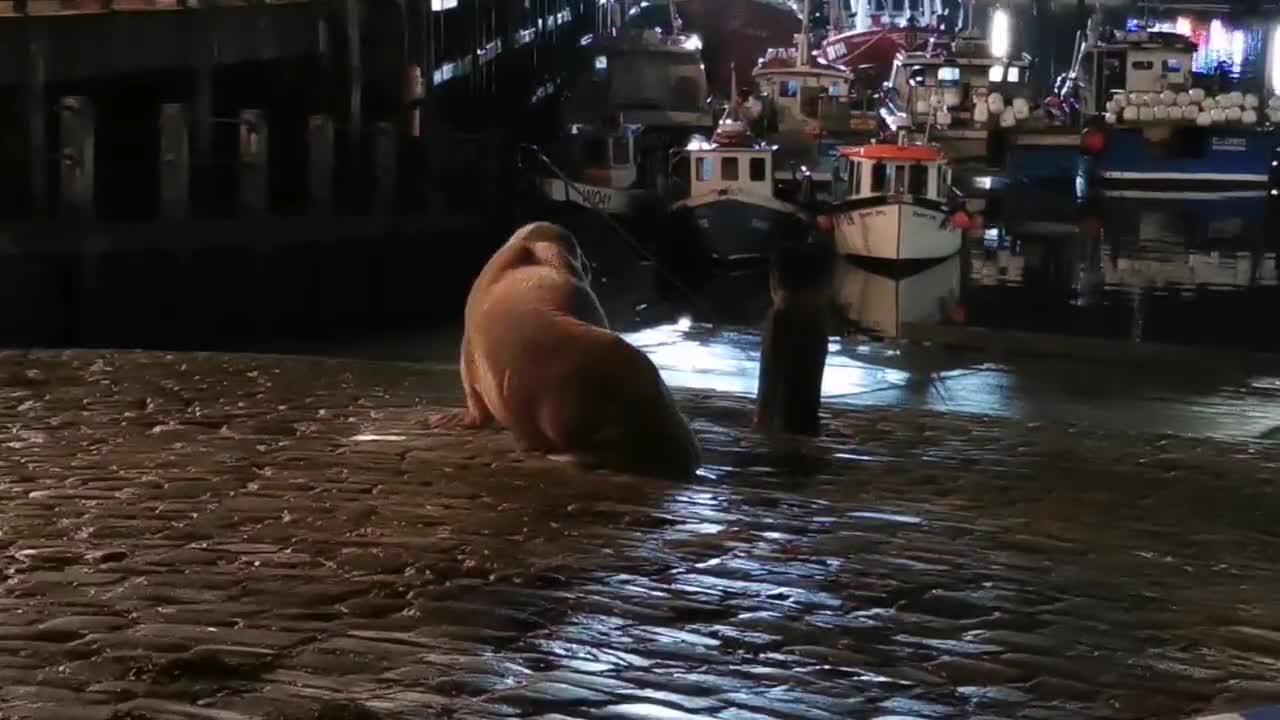Premium Only Content

THOR LOSER: Walrus Leaves UK For Colder Waters
This is Thor the walrus, who caused New Year's Eve fireworks to be cancelled at an English seaside town, as he leaves the UK to head north to colder waters.
His arrival also meant a long vigil for members of the British Divers Marine Life Rescue (BDLMR), who stood by to make sure he was not disturbed by revellers before heading back into the water to continue his journey.
The video was shared by Em Mayman, an assistant coordinator for the BDLMR.
In an interview with Newsflash, she said: "I'm 32 from Yorkshire, I work at a vet's as a day job and volunteer for BDMLR as an out-of-hours coordinator and assistant area coordinator for Yorkshire and Lincolnshire.
"I recorded the video in Scarborough when Chris Cook and myself were called to check it out.
"As area coordinators, we needed to get down there to see what was going on and plan the BDMLR response.
"We've not had a walrus in this part of the UK in a very, very long time.
"There have been dozens of sightings in the UK in the last 150 years, but we have now had confirmed sightings of three in just two years.
"Wally who eventually returned home in 2021, Freya who met her very untimely demise in Norway, and Thor.
"Thor is a young Arctic walrus at sexual maturity, around eight years old, and has been travelling between the UK and Europe over the past few months.
"At present, he is in good condition with no injuries."
She said the video was from the early hours of the morning while BDMLR area coordinators and Sea Life staff monitored him before the heavy footfalls of people in the morning.
The BDMLR, which normally rescues seals, whales, dolphins, and porpoises in the UK, said he briefly appeared in Blyth a few days ago but has now moved on again.
Em Mayman added: "All we can hope is that he is slowly heading home!"
Dan Jarvis, director of welfare and conservation at the BDLMR, said Thor was "heading in the right direction" and would "hopefully" leave Blyth on Tuesday at the latest to continue the journey north.
He noted that walruses were becoming increasingly common in European waters, which, he said, could be a sign of climate change causing a loss of sea ice used by walruses when they rest or digest meals.
-
 0:46
0:46
Dr Disrespect
14 hours agoIt's not just a stream... it's an experience
324K1.7K -
 5:45:38
5:45:38
80sKiid
9 hours ago $28.47 earnedFirst stream on RUMBLE!!!!!
95.2K5 -
 3:56:31
3:56:31
JakeParker
9 hours ago $14.17 earnedJakeParker is LIVE on Rumble
54K -
 8:09:23
8:09:23
SpartakusLIVE
10 hours ago $26.20 earnedThe Duke rallies squad for LAUGHS into the night with a SMATTERING of TOXIC banter
87.5K17 -
 1:03:51
1:03:51
Flyover Conservatives
1 day agoGeneration Z’s Revolution: 17 Year Old Author on the Return of Faith, Family, and the End of Feminism - Hannah Faulkner; Economic Update - Dr. Kirk Elliott | FOC Show
49.1K2 -
 1:12:43
1:12:43
Adam Does Movies
12 hours ago $20.91 earnedMoviegoers Are Singing Now! + Lilo & Stitch + Sonic 3 - LIVE!
83.8K7 -
 1:26:05
1:26:05
Donald Trump Jr.
15 hours agoRegime Media Imploding: What’s Next for MSNBC? Plus Michael Knowles & Alex Marlow | TRIGGERED Ep.194
235K245 -
 37:26
37:26
Glenn Greenwald
13 hours agoGlenn Takes Your Questions: On Trump's Cabinet, The G20 Summit, and More | SYSTEM UPDATE LOCALS SPECIAL
96.9K62 -
 2:10:20
2:10:20
We Like Shooting
20 hours ago $3.54 earnedWe Like Shooting 586 (Gun Podcast)
28.1K1 -
 52:14
52:14
Uncommon Sense In Current Times
14 hours ago $0.88 earned“Pumpkin Pie Politics: Bridging the Thanksgiving Divide to Protect The Family"
20.6K1